-
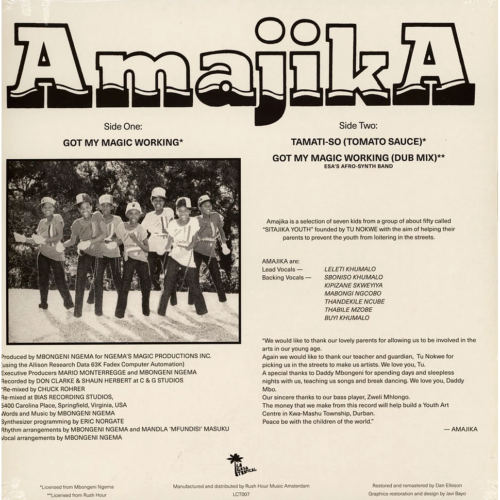
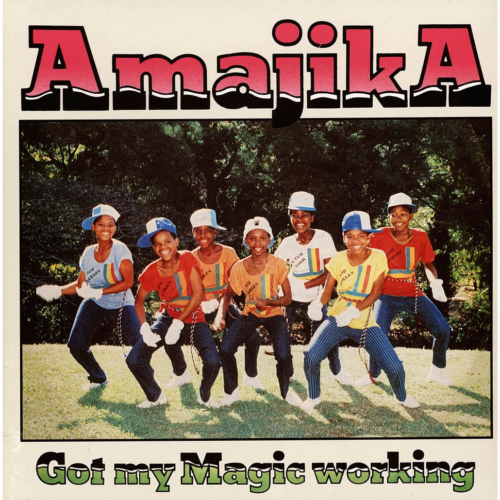 Heavy South African cut, unearthed by Dene from LCT, All about the massive title track ''Got My Magic Working''... Phat bassline, machinegun claps dipped in acid! The origins of Amajika is a tale of two worlds colliding at the perfect moment and begin in KwaMushu Township outside Durban. Here would be where a young Tu Nokwe would set up a school to help teach other aspiring youngsters like herself in music, dance and acting. This would become known as the Amajika Youth and Children’s Art Project and would be run from the Nokwe home, a common hangout for artists at the time. Some boast 2000+ pupils going through this program while others claim it wasn’t more than a backyard dance group, but for the lucky group of kids that were members in the mid 80s it would be their chance at stardom. It was during these years that a young aspiring playwright and musician Mbongeni Ngema had come across Tu and her group of gifted youngsters at the Nokwe family home. Although he was touring extensively at the time with the plays Woza Albert and Asinamali, the latter which eventually ended up on broadway, he would spend any time off from the tour with Tu and her dance troop. After being inspired by the American group New Edition, Mbongeni envisioned Amajika as the South African answer and decided to bankroll a studio session. The session would take place in a private studio in Durban.The release of the first single would follow very shortly. The lead track, Tomati-So is a fun swinging groove over some basic programmed drums. The song is dedicated to Tu Nokwe sings of her unique style and kind heart. On his next tour Mbongeni would take the remaining masters with him to the US and had the track remixed. Although it never materialized in a release States side he did return with the remixed tape and release it in South Africa the following year. Much like Tomato So the song was an ode and would be dedicated to the man who was making all their dreams come true. Got My Magic Working sings of going overseas and being a star on Broadway and TV and the man who is making it all happen. All these true predictions are sung on top of a groovy acid bass by a clearly matured troop of artists. During these years of working with Amajika, Mbongeni became very impressed with the exceeding talent of one of the members and decided to cast her in his upcoming musical Sarafina. The other children also wanted to be a part of the Broadway show but not everyone would get a role. This would be the end of Amajika as the next years would be dedicated to creating success on the musical stage. The growing kids that formed Amajika became young adults and pursued their own careers after the fact. Tu Nokwe would leave the country to return years later as the wife of Shaka Zulu on the big screen. To this day she is still very active both on stage and screen while Mbongeni is still writing and adding to the South African Musical Theatre catalog. Fast forward 30 years from the original release to a smokey club where ESA hears Got My Magic Working played by Rush Hours Store’s own Bonnefooi. Instantly he inquires about the track from his homeland and feels it a perfect addition the repertoire of the Afro Synth band he is quietly cooking up. The band’s instrumental take ended up as the B side on a mysterious and limited white label released by Rush Hour in early 2020 but quickly sold out. Here you have compiled the two title tracks from original Amajika singles along with the instrumental version by ESA’s Afro Synth Band for The complete Amajika experience, past to present.
Heavy South African cut, unearthed by Dene from LCT, All about the massive title track ''Got My Magic Working''... Phat bassline, machinegun claps dipped in acid! The origins of Amajika is a tale of two worlds colliding at the perfect moment and begin in KwaMushu Township outside Durban. Here would be where a young Tu Nokwe would set up a school to help teach other aspiring youngsters like herself in music, dance and acting. This would become known as the Amajika Youth and Children’s Art Project and would be run from the Nokwe home, a common hangout for artists at the time. Some boast 2000+ pupils going through this program while others claim it wasn’t more than a backyard dance group, but for the lucky group of kids that were members in the mid 80s it would be their chance at stardom. It was during these years that a young aspiring playwright and musician Mbongeni Ngema had come across Tu and her group of gifted youngsters at the Nokwe family home. Although he was touring extensively at the time with the plays Woza Albert and Asinamali, the latter which eventually ended up on broadway, he would spend any time off from the tour with Tu and her dance troop. After being inspired by the American group New Edition, Mbongeni envisioned Amajika as the South African answer and decided to bankroll a studio session. The session would take place in a private studio in Durban.The release of the first single would follow very shortly. The lead track, Tomati-So is a fun swinging groove over some basic programmed drums. The song is dedicated to Tu Nokwe sings of her unique style and kind heart. On his next tour Mbongeni would take the remaining masters with him to the US and had the track remixed. Although it never materialized in a release States side he did return with the remixed tape and release it in South Africa the following year. Much like Tomato So the song was an ode and would be dedicated to the man who was making all their dreams come true. Got My Magic Working sings of going overseas and being a star on Broadway and TV and the man who is making it all happen. All these true predictions are sung on top of a groovy acid bass by a clearly matured troop of artists. During these years of working with Amajika, Mbongeni became very impressed with the exceeding talent of one of the members and decided to cast her in his upcoming musical Sarafina. The other children also wanted to be a part of the Broadway show but not everyone would get a role. This would be the end of Amajika as the next years would be dedicated to creating success on the musical stage. The growing kids that formed Amajika became young adults and pursued their own careers after the fact. Tu Nokwe would leave the country to return years later as the wife of Shaka Zulu on the big screen. To this day she is still very active both on stage and screen while Mbongeni is still writing and adding to the South African Musical Theatre catalog. Fast forward 30 years from the original release to a smokey club where ESA hears Got My Magic Working played by Rush Hours Store’s own Bonnefooi. Instantly he inquires about the track from his homeland and feels it a perfect addition the repertoire of the Afro Synth band he is quietly cooking up. The band’s instrumental take ended up as the B side on a mysterious and limited white label released by Rush Hour in early 2020 but quickly sold out. Here you have compiled the two title tracks from original Amajika singles along with the instrumental version by ESA’s Afro Synth Band for The complete Amajika experience, past to present. -
Ausverkauft

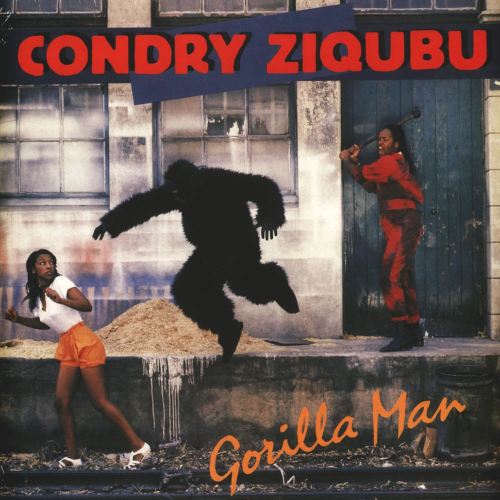 Four tracks by one of the biggest names in South African disco: Condry Ziqubu. A regular on the local soul scene since the late 1960s in groups such as The Flaming Souls, The Anchors and The Flaming Ghettoes, by the mid-80s he had qualified as a sangoma (traditional healer), recorded with Harari (the biggest group in the country at the time), fronted his own group Lumumba, and travelled the world as part of Caiphus Semenya and Letta Mbulu’s band. In 1986 he ditched Lumumba and released his first solo hit, ‘Gorilla Man’. Opening with an audacious 20-second intro, the song tells the story of a man preying on women in downtown Johannesburg. It highlights Condry’s winning formula of lyrics that touch on everyday South African issues and places (without drawing the attention of apartheid censors). Musically the song draws obvious influence from Piano Fantasia’s 1985 Euro-disco hit ‘Song for Denise’. Also included on this new anthology is another song from the same album, the politically charged ‘Confusion (Ma Afrika)’, as well as ‘Phola Baby’ from his 1988 album Pick Six – a call to men to “stop pushing your woman around … what kind of man are you?” – and ‘Everybody Party’ from 1989’s Magic Man, a straight-up party song with no political or social intimations, other than as a brief escape from the harsh reality of the time, one that still resonates today. Gorilla Man will be released on vinyl and digitally in early 2021 on Johannesburg-based Afrosynth Records (afs047), distributed worldwide by Rush Hour in Amsterdam.
Four tracks by one of the biggest names in South African disco: Condry Ziqubu. A regular on the local soul scene since the late 1960s in groups such as The Flaming Souls, The Anchors and The Flaming Ghettoes, by the mid-80s he had qualified as a sangoma (traditional healer), recorded with Harari (the biggest group in the country at the time), fronted his own group Lumumba, and travelled the world as part of Caiphus Semenya and Letta Mbulu’s band. In 1986 he ditched Lumumba and released his first solo hit, ‘Gorilla Man’. Opening with an audacious 20-second intro, the song tells the story of a man preying on women in downtown Johannesburg. It highlights Condry’s winning formula of lyrics that touch on everyday South African issues and places (without drawing the attention of apartheid censors). Musically the song draws obvious influence from Piano Fantasia’s 1985 Euro-disco hit ‘Song for Denise’. Also included on this new anthology is another song from the same album, the politically charged ‘Confusion (Ma Afrika)’, as well as ‘Phola Baby’ from his 1988 album Pick Six – a call to men to “stop pushing your woman around … what kind of man are you?” – and ‘Everybody Party’ from 1989’s Magic Man, a straight-up party song with no political or social intimations, other than as a brief escape from the harsh reality of the time, one that still resonates today. Gorilla Man will be released on vinyl and digitally in early 2021 on Johannesburg-based Afrosynth Records (afs047), distributed worldwide by Rush Hour in Amsterdam. -
 Double sider 12" including the bubblegum club track ''Let's Make a Deal'' by Linda "Babe” Majika, which was originally released on the rare 'Don’t Treat Me So Bad' lp in South-Africa, 1988. On the flip, you’ll find the deep late-night saxophone driven tune ''Step Out Of My Life'' which includes Don Laka on the keyboard and is produced by Ray Phiri, who also founded the popular South African group 'Stimela'. The song was originally released in 1989 and finally sees a reissue, pressed as a loud DJ-friendly 12-inch.
Double sider 12" including the bubblegum club track ''Let's Make a Deal'' by Linda "Babe” Majika, which was originally released on the rare 'Don’t Treat Me So Bad' lp in South-Africa, 1988. On the flip, you’ll find the deep late-night saxophone driven tune ''Step Out Of My Life'' which includes Don Laka on the keyboard and is produced by Ray Phiri, who also founded the popular South African group 'Stimela'. The song was originally released in 1989 and finally sees a reissue, pressed as a loud DJ-friendly 12-inch. -
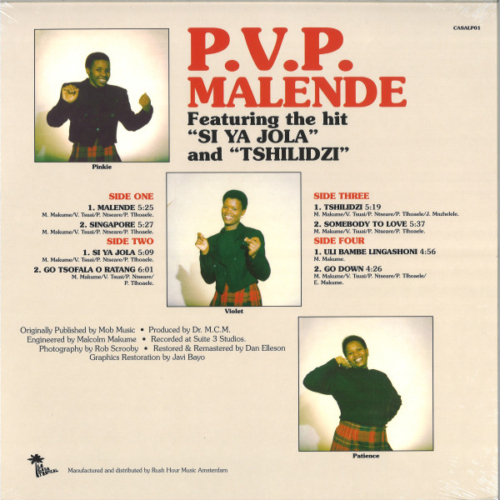
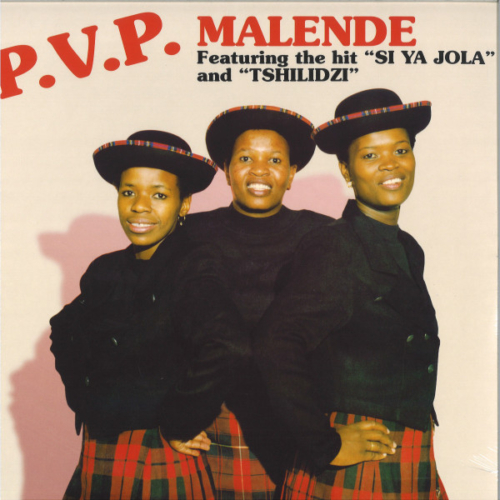 Following a two track 12" the whole fantastic album is remastered for a debut 2LP re-pressing. Patience, Violet ,and Pinky recorded their first Album in 1992. Knowing each other from the music scene, the back up singers turned friends teamed up with Emmanuel Diale and signed with Mob Music to embark on their music career as their own act. The first two albums were straight African Disco, A leftover sound of the 80's that some had still hoped to capitalize on. By the time they released their third album Why O Nketsa so Baby, loosely translated to "Why are you doing this to me Baby", Kwaito was still called either Disco or International House, and it was new sound that was taking over. The third album was influenced by the Shangaan sound made largely popular by artists like Penny Penny and Peta Teanet. Looking back now, at the time Mob Music was really leading the pack with this new sound. Being one of the last labels to have official releases with artwork and a group of young talented producers given full creative freedom they pushed the sound in a way only few other labels of that time can be given the same credit. For their fourth and final album on Mob Music they worked with legendary producer/songwriter Malcom "X" Makume. With three years of songwriting experience and stellar talent behind the desk the result was the LP Malende. Eight tracks that would combine the early kwaito sound with the more uptempo International House topped off with productions heavily inspired by what had been slowly making its way from Chicago over the last 10 years. At the time they had some success and to this day are well known amongst the real heads. The girls would go on to record one final album once their contract with Mob was up and then after a 5 album catalog would hang up their matching outfits for work a in a newly free South Africa. They remain friends to this day.
Following a two track 12" the whole fantastic album is remastered for a debut 2LP re-pressing. Patience, Violet ,and Pinky recorded their first Album in 1992. Knowing each other from the music scene, the back up singers turned friends teamed up with Emmanuel Diale and signed with Mob Music to embark on their music career as their own act. The first two albums were straight African Disco, A leftover sound of the 80's that some had still hoped to capitalize on. By the time they released their third album Why O Nketsa so Baby, loosely translated to "Why are you doing this to me Baby", Kwaito was still called either Disco or International House, and it was new sound that was taking over. The third album was influenced by the Shangaan sound made largely popular by artists like Penny Penny and Peta Teanet. Looking back now, at the time Mob Music was really leading the pack with this new sound. Being one of the last labels to have official releases with artwork and a group of young talented producers given full creative freedom they pushed the sound in a way only few other labels of that time can be given the same credit. For their fourth and final album on Mob Music they worked with legendary producer/songwriter Malcom "X" Makume. With three years of songwriting experience and stellar talent behind the desk the result was the LP Malende. Eight tracks that would combine the early kwaito sound with the more uptempo International House topped off with productions heavily inspired by what had been slowly making its way from Chicago over the last 10 years. At the time they had some success and to this day are well known amongst the real heads. The girls would go on to record one final album once their contract with Mob was up and then after a 5 album catalog would hang up their matching outfits for work a in a newly free South Africa. They remain friends to this day. -
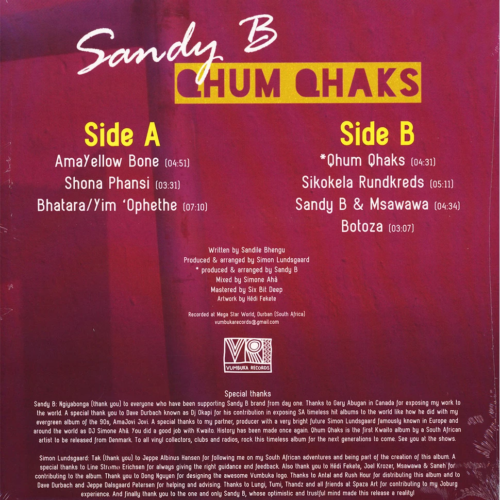
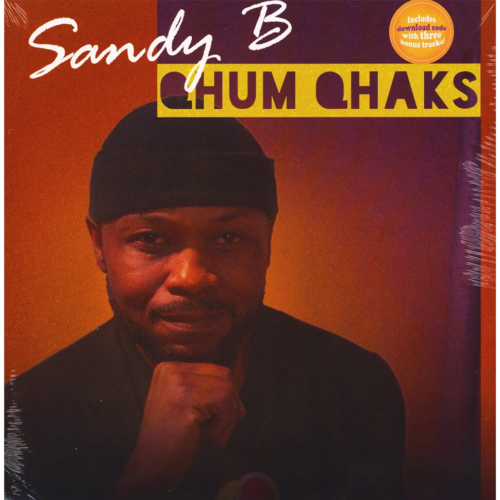 New material by Sandy B! South African Kwaito inspired music on this one....check out "Qhum Qhaks" which is a favorite here... Sandile Bhengu comes from Durban, South Africa, where he in the middle of the 90’s released his debut kwaito album Amajovi Jovi under the moniker Sandy B. During the following decades he would move actively within the local music scene and touch a variety of genres including afro-pop, deep house, R’n’B and Soul. In the mid 2010’s around 20 years since its release crate diggers and DJ’s across Europe and North America started dropping tracks from Amajovi Jovi. In late 2017 the album was reissued on Canadian label, Invisible City Editions giving a new lease of life to a forgotten classic and giving this once little known artist an international reputation. Following the successful re-issue of the 1995-album Sandy B returns to the forefront of music with original material 24 years later in the form of Qhum Qhaks. Qhum Qhaks comes from a close collaboration between Sandy and Danish DJ and collector Simon Lundsgaard a.k.a Simone Ahà. All songs were recorded in Sandy’s home studio to stick close to the ethics and production techniques of the 1995 classic. The material that emerged from this experimental process between the two of them captures the spirit of old school kwaito from the 90’s. Vumbuka Records was founded by Sandile Bhengu & Simon Lundsgaard in 2019 especially for the release of Qhum Qhaks. The vinyl release of Qhum Qhaks contains seven original tracks and a download code with three extra bonus tracks.
New material by Sandy B! South African Kwaito inspired music on this one....check out "Qhum Qhaks" which is a favorite here... Sandile Bhengu comes from Durban, South Africa, where he in the middle of the 90’s released his debut kwaito album Amajovi Jovi under the moniker Sandy B. During the following decades he would move actively within the local music scene and touch a variety of genres including afro-pop, deep house, R’n’B and Soul. In the mid 2010’s around 20 years since its release crate diggers and DJ’s across Europe and North America started dropping tracks from Amajovi Jovi. In late 2017 the album was reissued on Canadian label, Invisible City Editions giving a new lease of life to a forgotten classic and giving this once little known artist an international reputation. Following the successful re-issue of the 1995-album Sandy B returns to the forefront of music with original material 24 years later in the form of Qhum Qhaks. Qhum Qhaks comes from a close collaboration between Sandy and Danish DJ and collector Simon Lundsgaard a.k.a Simone Ahà. All songs were recorded in Sandy’s home studio to stick close to the ethics and production techniques of the 1995 classic. The material that emerged from this experimental process between the two of them captures the spirit of old school kwaito from the 90’s. Vumbuka Records was founded by Sandile Bhengu & Simon Lundsgaard in 2019 especially for the release of Qhum Qhaks. The vinyl release of Qhum Qhaks contains seven original tracks and a download code with three extra bonus tracks. -
Ausverkauft
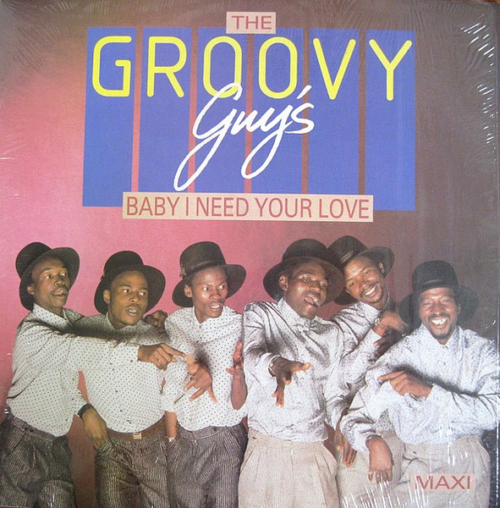 Used Vinyl Rare South African boogie!! Recordwith superficial wear, plays VG+. Cover has clear tape at edges. VG+/VG-
Used Vinyl Rare South African boogie!! Recordwith superficial wear, plays VG+. Cover has clear tape at edges. VG+/VG-